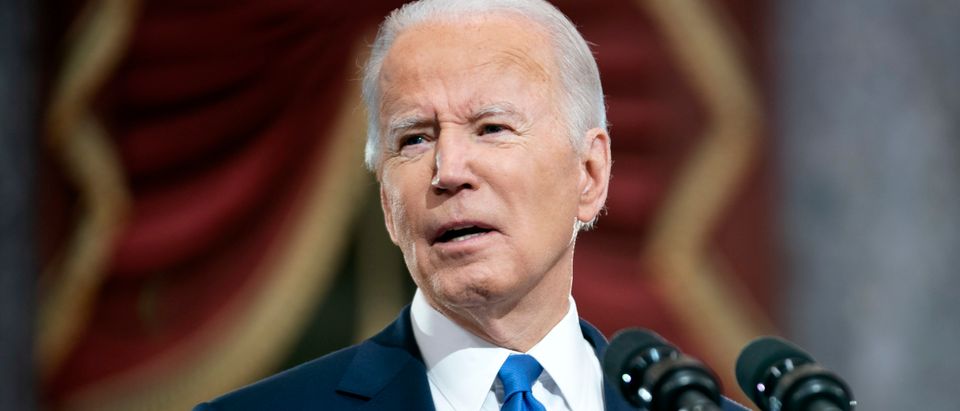Presidential State of the Union addresses are often delivered in January. The White House has announced that President Joe Biden will give his first SOTU address to Congress on March 1, roughly six weeks from now.
Last week in Atlanta, Biden delivered what amounted to his first State of Dis-Union speech when he asked Congress to enact his voting bills. Biden portrayed a nation at war with itself, as he branded his political opponents as dangerous subversives.
So much for the national unity Biden promised in last year’s inaugural address. Biden’s Atlanta remarks have drawn bipartisan criticism, and you must wonder what prompted the president to offer up such red meat vitriol at a time when so many Americans are unsettled about the nation’s future.
This is not a good time to be a White House speechwriter, but be assured: preparations for feeding Biden’s teleprompter are well underway. Those speechwriters will need all the extra time.
As recent polling indicates, over 60% of Americans believe the country is on the wrong track.
So what does Biden do? What does he say?
Should he agree with most Americans, or suggest that they really can’t believe the unambiguous, nonpartisan evidence that keeps piling up right before them, day after day?
Afghanistan. COVID. An open border. Rising energy prices. Rampant inflation. Supermarket shortages. Racial tensions. Escalating violent crime. China. Russia. Iran.
No doubt Biden hopes that by moving his address to a later-than-usual date his presidential metrics will have improved by then.
In preparing for this annual ritual, White House speechwriters develop multiple drafts and receive input from sources in and out of government. The West Wing policy folks are on the receiving end of (mostly unsolicited) phone calls and e-mails from Cabinet members, sub-Cabinet members, members of Congress, governors, major donors, lobbyists and “friends of Joe,” all touting some miracle cure policy that deserves at least a mention in the president’s speech.
State of the Union speeches are not known for their inspiring, memorable rhetoric. For the most part, these annual exercises in bombast have become laundry lists of partisan proposals crafted to obtain the maximum number of televised standing ovations and sustained applause, dutifully calculated and reported by post-speech pundits.
President John Adams delivered the first in-person State of the Union address to a joint congressional session in the Capitol in 1800. Subsequent presidential addresses were written messages hand-delivered annually to Congress. In 1913, President Woodrow Wilson revived Adams’s approach by delivering his State of the Union message in person.
As with any speech, the first issue is its content, and that is where Joe Biden faces an enormous obstacle: what does this president actually believe? What does he really want to accomplish?
A year ago, in his inaugural address, Biden spoke about healing and uniting the nation. Yet, he has governed not as the moderate centrist Democrat most Americans expected but rather as an extreme progressive who has catered to the Bernie Sanders-Alexandria Ocasio-Cortez wing of the Democratic Party.
Is Biden’s behavior surprising? Not really when you consider an important aspect of his personal history and character: his serial plagiarism. First in 1965 as a law student at Syracuse University College of Law and again in 1987 when, during a presidential primary debate, he lifted passages verbatim from remarks given by former British Labour Party leader Neil Kinnock. Biden’s campaign imploded immediately thereafter.
Why do people plagiarize other people’s work? There are basically three reasons: they’re lazy; they have no ideas of their own; or they’ve made a careless, innocent mistake.
Researchers and writers have admitted to innocent mistakes, especially when taking notes from a source and being somewhat sloppy in omitting quotation marks and attributions. This was not Joe Biden’s excuse.
Joe Biden has spent a good portion of his adult life living in a world of other people’s words. No one expects a president to draft all of his speeches, and there’s nothing wrong with having a bevy of speechwriters on call.
But Joe Biden’s presidency thus far has shown us a man who doesn’t know his own mind. Bernie Sanders basically drafted Biden’s domestic agenda, and at almost all of his public appearances, Biden reads somebody else’s words fed into a teleprompter. Untethered from that technology, Biden frequently lapses into incoherence.
Who is Joe Biden today? What does he really think? And can he tell us, in his own words, what’s the real state of Joe Biden?
Charles Kolb served as Deputy Assistant to the President for Domestic Policy from 1990-1992 in the George H.W. Bush White House


